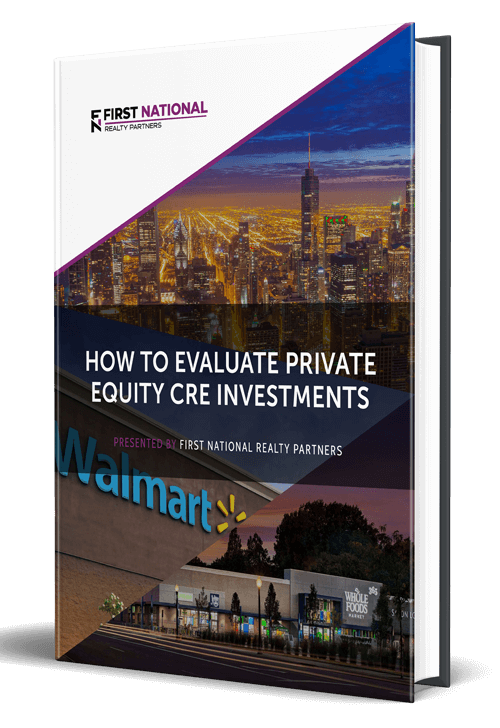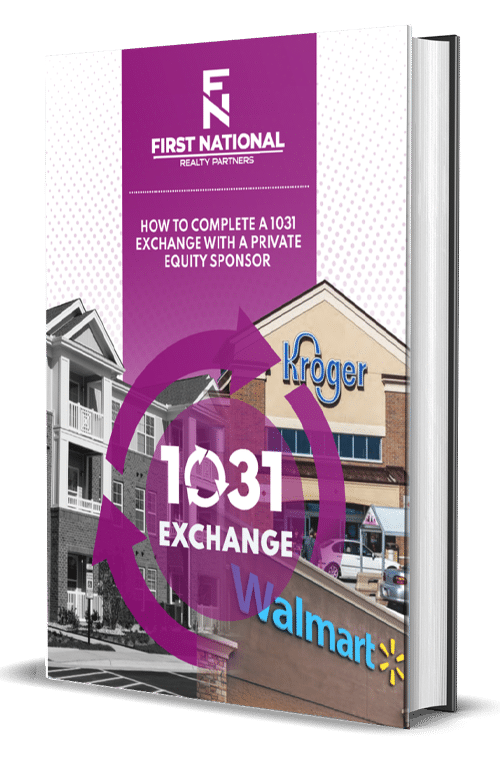If an individual is interested in real estate investing in the United States, one of the questions that they may have to consider is whether to deploy their money into residential real estate or commercial real estate.
A residential rental property could be anything from a single family home to a “quadplex”, which is a property that has four separate living spaces. Investing in a residential property offers several benefits including: low price points, which decreases the amount of capital required to start, widely available financing at favorable terms, and the potential for a stable stream of cash flow. But, for investors who prioritize growth and scale, they can also offer several drawbacks including: short term leases (~12 Months), difficulty in scaling, time consuming management, high “turn” costs, and difficulty in finding creditworthy tenants. For these reasons, some investors prefer commercial real estate.
A commercial real estate investment property is different from residential in a number of ways. First, with the exception of multifamily, it involves space that is leased to businesses, not people. Second, there are a variety of “asset classes” or property types like, Office, Retail, Industrial, and Multifamily, each of which have their own unique characteristics. Third, the leases tend to have longer terms that can go up to 25 years in certain circumstances. Finally, income and expenses tend to be booked in a separate legal entity which can provide several tax advantages over the residential alternative.
For investors who have the required risk tolerance, time horizon, and interest in scaling their portfolio, there are a number of commercial real estate investment “vehicles” through which an investor deploy their funds.
At FNRP, we believe that commercial real estate is the superior asset type. To learn more about our world-class CRE deals, click here.
Direct Investment
The first, and sometimes most obvious, choice is for an individual or group of individuals to purchase a property directly. The benefit of this method is that, as the property owner, it provides the investor with direct control over the property selection, due diligence, financing, leasing, and management processes. But, it also comes with the time consuming responsibility of managing the asset on a day to day basis and exposure to the financial liability that could result from a deal that goes south.
More importantly, commercial properties – especially the best ones – are expensive and likely out of reach for all but the wealthiest individual investors with the most liquidity. For example, a Class A commercial office building in a prime location could cost tens of millions of dollars, which puts it out of reach for most individuals. As an alternative, they could purchase a smaller asset (like a small apartment building), but it wouldn’t provide the same scale as the larger office building.
For real estate investors with a desire to invest in professional grade commercial real estate assets, but not the bank roll or time to devote to management, they can invest indirectly.
Indirect Investment
Broadly, an indirect investment means that the individual places their funds with a professional asset manager (like us) and outsources the task of selecting, financing, and managing the property to them. The obvious benefit with an indirect investment is that the individual gets all of the benefits of ownership without the hassle of managing the property. For individuals who choose to make an indirect investment, there are several vehicles through which the funds can be deployed:
Real Estate Investment Trust (REIT)
A Real Estate Investment Trust (REIT) is a company that owns, operates, or finances income-producing real estate. Because REITs are formed as corporate entities, investors are able to purchase shares in them, which provide access to the income and profits produced by the underlying real estate assets. In addition, a REIT structure has tax benefits and, for a company to qualify for REIT status, they must meet the following IRS requirements:
- Invest at least 75% of total assets in real estate
- Derive at least 75% of gross income from rents on real property, interest on mortgages financing real property, or from sales of real estate
- Pay at least 90% of taxable income in the form of shareholder dividends annually
- Be an entity that is taxable as a corporation
- Be managed by a board of directors or trustees
- Have a minimum of 100 shareholders
- Have no more than 50% of shares held by five or fewer individuals
For those that choose to invest in REITs, they can realize a number of benefits including income, portfolio diversification, a high degree of governance and oversight when it comes to purchasing and managing assets and generally strong performance relative to the investment alternatives.
While the benefits can be attractive, REITs can also be growth constrained because they’re required to pay at least 90% of their taxable income as dividends. And, those same dividends are taxed as ordinary income for the investors who receive them. In addition, publicly traded REIT price movements can have some volatility, which doesn’t always reflect the fundamentals of the underlying assets. Finally, REITs often have a high front-end “load”, meaning that they will take 5% – 10% of the initial investment in the form of fees. To mitigate these risks – and others – investors seeking REIT alternatives often turn to Private Equity Real Estate firms.
Private Equity Real Estate
Like a REIT, a Private Equity Real Estate firm has a mandate to pool investor money and deploy it in real estate assets. However, the securities offered by Private Equity Real Estate firms are not publicly traded and they are only available to “accredited” or high net worth investors. Private equity deals can be structured as real estate funds, where an investor pledges money to a fund and allows the manager to choose how to invest it. Or, the transactions can be structured as individual deals where the investor has some degree of control over the choice of what property to invest in.
Because they aren’t bound by the same regulations as publicly-traded REITs, private equity firms have wide latitude to invest in a variety of real estate asset classes (like office space, multifamily, or industrial), which may or may not include income-producing properties. In addition, the legal structure may differ significantly from a REIT and they are not required to pay out a high percentage of their income in dividends. Instead, the majority of private equity returns are derived from profitable investment exits in the form of capital gains and carried interest.
Like REITs, a private equity real estate investment comes with impressive benefits including, the asset manager’s operational expertise, tax efficiency, the flexibility to acquire assets in a variety of classes, passive income and a return structure that aligns the financial incentives of the manager and the investor.
Also Like REITs, private equity real estate investments are not risk-free. They often require long holding periods, aren’t liquid, and their success is closely correlated with the experience, expertise, and track record of the investment manager. In addition, they can be expensive because private equity firms charge asset management fees, acquisition fees, and participate in the profits once certain return hurdles are met. In addition, they are only available to accredited investors who have met minimum income and net worth requirements.
Debt / Mortgages
Instead of purchasing physical property, some asset managers deploy investor capital into commercial debt and mortgages. Instead of benefiting from the income produced by tenant rents, investors benefit from the income produced by payments on the loan.
The primary benefit of a debt investment is that an investor earns interest on the money owed to them and it is repaid in installments, funded by property rents. This stream of income is secured by a mortgage or “lien” on the property, which means that if the borrower stops making payments on the loan, the debt holder has the ability to initiate foreclosure proceedings to take control of the asset. For this reason, senior debt is considered to be a relatively safe investment.
The primary risk for debt holders is that, for a variety of reasons, the property fails to produce enough income to make the loan payments. In addition, the debt holder may be concerned that the maintenance and upkeep of the property falls behind, causing tenants to leave and rental rates to call. To protect against this, the Loan Agreements usually contain a set of “covenants” that the borrower has to abide by. A breach of a covenant is a “technical default” and could open the door to the debt holder taking control of the property.
There is no “right” way to indirectly invest in commercial real estate. We always encourage our clients to evaluate the pros and cons of each option and to choose the one that is right for their individual investment strategy, risk tolerance, return requirements, and time horizon.
Interested in Learning More?
First National Realty Partners is one of the country’s leading private equity commercial real estate investment firms. With an intentional focus on finding world-class, multi-tenanted assets well below intrinsic value, we seek to create superior long-term, risk-adjusted returns for our investors while creating strong economic assets for the communities we invest in.
To learn more about our investment opportunities, contact us at (800) 605-4966 or info@fnrpusa.com for more information.






